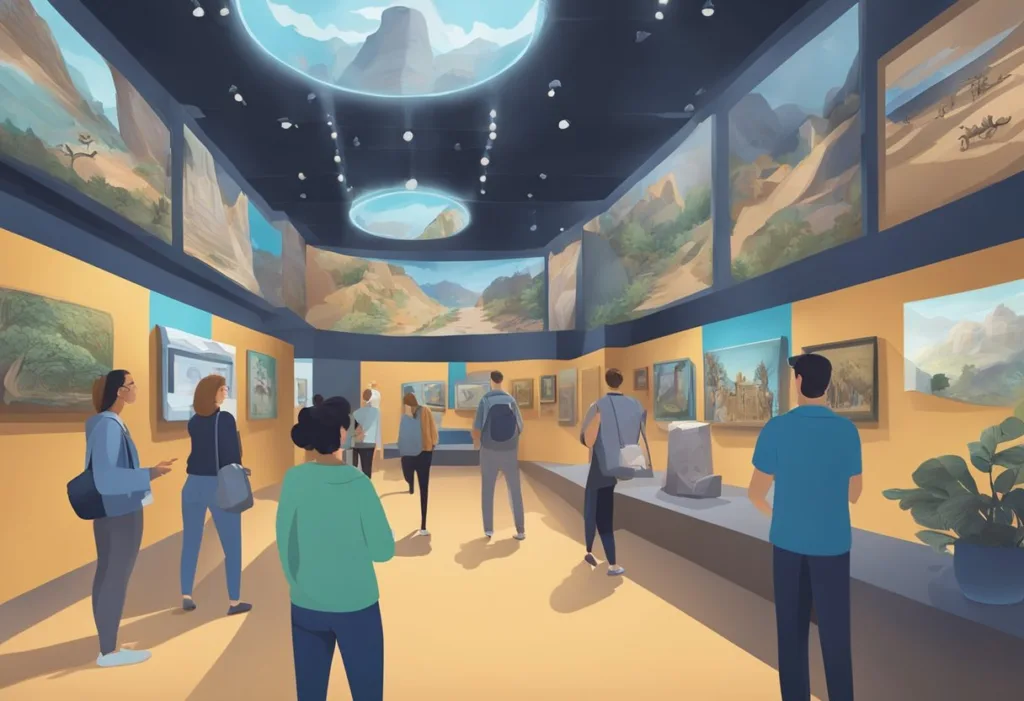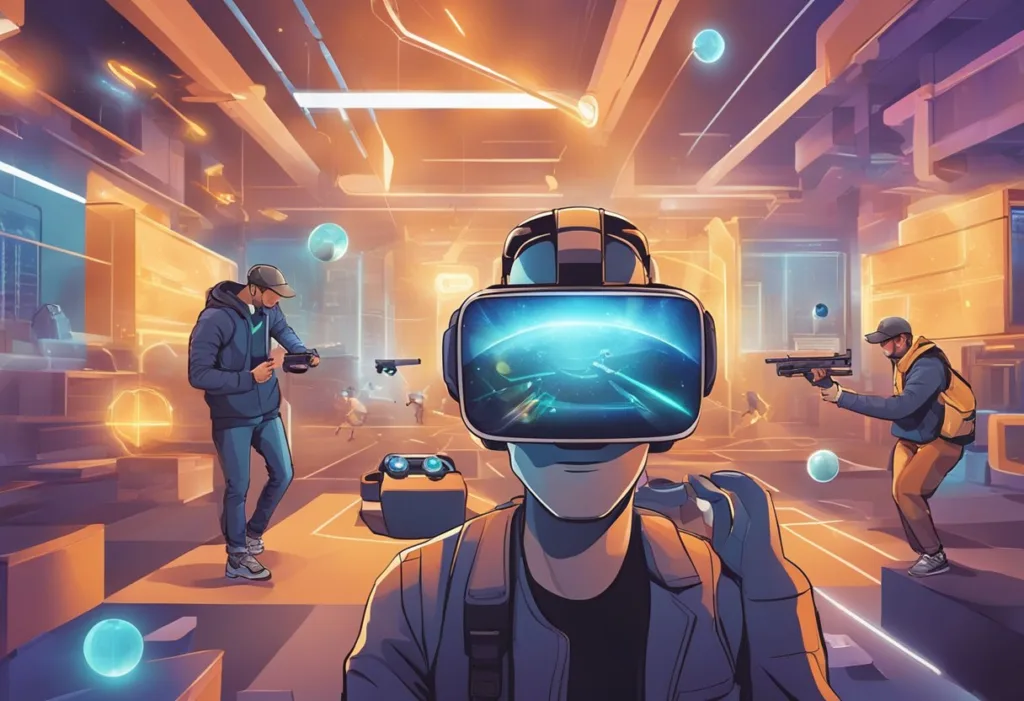The metaverse is a term that has gained popularity in recent years, often used in science fiction and futuristic works. But what exactly is the metaverse in simple terms? In this blog post, we will explore the concept of the metaverse in simple terms and its potential impact on our society.
What is the metaverse in simple terms?
In simple terms, the metaverse is a vast and interconnected virtual universe where people can interact through digital avatars. It blurs the lines between the real world and virtual worlds, offering a shared virtual environment where users can explore, work, socialize, and play.
Imagine a space where you can put on VR headsets or augmented reality glasses to access a digital world filled with immersive experiences, akin to an evolution of the internet.
What exactly does the metaverse do?
The metaverse primarily serves as a platform for a wide range of activities. It offers virtual spaces for virtual meetings, and immersive video games, and even hosts events like virtual concerts. Users can create and trade digital assets and establish their digital identity within this digital realm.
It’s essentially a convergence of cloud computing, artificial intelligence, and blockchain technology that enables rich social interaction and digital ownership. It connects people globally in a way that transcends physical barriers, revolutionizing how we engage with the digital economy.
How can the metaverse help businesses?
The metaverse presents exciting opportunities for businesses. They can establish a presence in this digital landscape through metaverse platforms, creating virtual environments for customer engagement and collaboration.
This can include hosting product launches, virtual showrooms, or even offering services within the metaverse. Businesses can tap into the metaverse economy by developing and selling digital assets, advertising, or providing metaverse-related services.
It’s a new frontier for business models and marketing strategies, potentially expanding their reach and customer base in ways previously unimaginable in the real world.
How can the metaverse revolutionize the world?
The metaverse has the potential to revolutionize the world by reshaping how we interact with technology and each other. It can break down physical barriers, offering a bridge between real life and digital life, enabling global collaboration, learning, and socializing.
This interconnected virtual universe can transform industries, from education to entertainment, by offering immersive experiences and novel ways of conducting business.
It can also drive technological advancements, making use of extended reality and virtual reality to create experiences that were once confined to science fiction. In essence, it’s a paradigm shift in the way we perceive and engage with the world around us.
How can the metaverse assist in education?
The metaverse can be a game-changer in education. It offers a dynamic and immersive virtual environment where students and educators can engage in virtual meetings and classes, transcending geographical boundaries.
Imagine history lessons where students can step into historical events, or science experiments conducted in a digital world. Virtual spaces can host collaborative projects and workshops, fostering creativity and problem-solving.
With its integration of augmented reality and virtual reality, the metaverse provides an interactive and engaging learning experience, enhancing retention and comprehension.
It can democratize education by making quality resources accessible to anyone with an internet connection, leveling the playing field for learners worldwide.
How can the metaverse benefit us?
The metaverse offers numerous benefits to individuals. It provides a space for social interaction, allowing people to connect with others globally through their digital avatars. This can combat loneliness and foster a sense of belonging in a virtual community.
Furthermore, it can be a source of entertainment, with immersive video games, concerts, and events. It also opens up opportunities for remote work, enabling individuals to collaborate in a virtual workspace.
Moreover, the metaverse can offer a new avenue for personal expression and creativity, allowing users to create and trade digital assets and develop their digital identity. Overall, it enriches our lives by offering diverse experiences and connections beyond the boundaries of the physical world.
Can the metaverse pose any risks to users?
While the metaverse has immense potential, it also comes with risks. These include issues related to digital privacy, as users’ actions and interactions are tracked within the digital realm.
There are concerns about digital addiction and the potential for users to become overly immersed, neglecting their real-world responsibilities.
Cybersecurity threats could compromise personal data and digital assets. The metaverse may also raise ethical dilemmas, such as issues of consent and content moderation.
Therefore, as we embrace this evolving technology, tech companies and regulators must establish safeguards and guidelines to ensure a safe and secure experience for all users.
How can the metaverse support fashion brands?
Fashion brands can leverage the metaverse to revolutionize their marketing and customer engagement strategies.
They can create virtual fashion showrooms where users can try on digital clothing using their avatars.
Brands can sell digital fashion items that users can flaunt in the metaverse. Furthermore, they can host exclusive metaverse-based events and collaborations with virtual influencers, expanding their reach to a global audience.
The metaverse offers a novel canvas for creativity, allowing fashion brands to experiment with digital design and aesthetics.
In essence, it’s a new frontier for the fashion industry to explore, enhancing brand visibility and customer engagement in virtual spaces.
Can the metaverse be stopped or regulated?
The metaverse is a decentralized and global phenomenon, making it challenging to completely stop or regulate.
It operates across various metaverse development platforms, often owned by different tech giants, and transcends geographical boundaries.
Regulation would require international cooperation and the development of new legal frameworks that consider digital ownership and user rights.
While some aspects of the metaverse may be regulated, like cybersecurity and digital privacy, it’s more likely that efforts will focus on creating a safe and ethical metaverse environment rather than trying to stop it.
The metaverse is a reflection of our evolving digital world, and its growth is driven by the collective efforts of users, developers, and businesses.
Where can I play in the metaverse?
You can experience the metaverse on various platforms and through VR headsets, such as the Oculus Quest 2.
Popular metaverse platforms like Horizon Worlds offer interactive virtual spaces where you can socialize, play games, attend events, and even build your virtual creations.
Many video games have integrated metaverse elements, allowing players to interact in shared virtual spaces.
As the metaverse continues to evolve, more opportunities for play and exploration will emerge, making it an exciting and dynamic digital realm to engage with.
Where can I buy land in the metaverse?
You can buy land in the metaverse on various virtual world platforms, often using cryptocurrency or digital assets.
Popular platforms like Decentraland and The Sandbox offer virtual real estate where you can purchase land parcels.
These parcels can be developed, customized, and monetized, creating opportunities for virtual businesses and experiences.
Just like in the real world, the value of virtual land can fluctuate based on demand and development.
Keep an eye on metaverse marketplaces and auctions to find your piece of the digital frontier.
Where did the concept of the metaverse originate?
The concept of the metaverse originated from science fiction, notably in Neal Stephenson’s 1992 novel “Snow Crash.” In the book, the metaverse is a virtual reality-based successor to the internet where people interact as avatars.
This visionary concept influenced subsequent discussions about the convergence of virtual worlds, the digital economy, and the real world.
Over the years, advancements in technology and the evolution of the internet have brought us closer to realizing this fictional vision, with the metaverse now becoming a tangible part of our digital reality.
Where is the metaverse currently being used?
The metaverse is currently being used in various ways, including gaming, social interactions, and business applications.
Gaming platforms like Roblox and Fortnite incorporate metaverse elements by providing shared virtual spaces where players can socialize, create, and play together. Social platforms like Facebook Horizon and VRChat offer immersive metaverse experiences for users to interact and explore.
In the business world, companies are using the metaverse for virtual conferences, team collaborations, and even hosting virtual showrooms and events.
As technology continues to advance, the applications of the metaverse will only expand, impacting how we live, work, and play in digital spaces.
Where is the metaverse hosted?
The metaverse is hosted on various servers and cloud infrastructure provided by tech companies and metaverse platform developers.
These servers are distributed globally to ensure low latency and high availability for users worldwide.
Tech giants like Amazon, Google, and Microsoft play a significant role in providing the necessary cloud computing infrastructure to support the metaverse.
Many metaverse platforms have their server infrastructure to host virtual worlds, ensuring a seamless and immersive experience for users as they navigate this digital frontier.
Where is the metaverse headed in the future?
The future of the metaverse is incredibly promising and dynamic. We can expect continued advancements in virtual reality, augmented reality, and artificial intelligence to make the metaverse even more immersive and interactive.
It will likely become an integral part of our daily lives, impacting how we work, socialize, and consume entertainment.
As tech industry giants invest heavily in its development, we can anticipate a growing ecosystem of applications and services within the metaverse.
It will evolve into a vibrant digital universe where innovation knows no bounds, reshaping industries and redefining the way we experience the digital and physical worlds.
Where can fintech take advantage of the metaverse?
Fintech companies can harness the power of the metaverse in multiple ways. They can offer virtual banking services, allowing users to manage their finances and investments within the metaverse.
Cryptocurrency transactions and blockchain technology can play a significant role in enabling secure and decentralized financial interactions.
Moreover, fintech can facilitate digital asset trading within the metaverse, as users buy, sell, and trade virtual goods and currencies. Insurance and risk assessment in virtual environments can also become prominent.
As the metaverse continues to grow, it offers fintech an expansive digital frontier to innovate and create new financial services and solutions, shaping the metaverse economy.
Where does Sonic the Hedgehog fit in the metaverse?
Sonic the Hedgehog, as an iconic video game character, has the potential to play a significant role in the metaverse.
Sega, the company behind Sonic, can create virtual experiences and games featuring Sonic within the metaverse.
Sonic-themed virtual items and assets can be bought and sold in metaverse marketplaces, adding value to the Sonic franchise.
Sonic can make appearances in metaverse-based events, attracting fans and engaging with a new generation of gamers within virtual spaces.
In essence, Sonic the Hedgehog can seamlessly transition from the world of traditional video games to becoming a beloved character within the ever-expanding metaverse.
Can I use Oculus Quest 2 in the metaverse?
Yes, you can use the Oculus Quest 2 in the metaverse. Oculus Quest 2 is a popular VR headset that offers an immersive experience, making it well-suited for exploring and interacting with the metaverse
It provides access to various metaverse platforms and virtual worlds where you can socialize, play games, attend events, and more.
The headset’s wireless and standalone design enhances your freedom to navigate and engage in these virtual spaces comfortably.
Oculus Quest 2 exemplifies the synergy between VR technology and the metaverse, offering users a gateway to the interconnected digital universe.
What is the significance of QR codes in the metaverse?
QR codes hold significant importance in the metaverse as they provide a seamless bridge between the physical and digital worlds.
Users can scan QR codes in the real world to access specific locations, events, or content within the metaverse.
For example, a QR code on a poster might lead to a virtual concert, a store in the metaverse, or a social gathering.
This technology enables easy onboarding and engagement, making it accessible to a broader audience.
QR codes serve as a practical tool for connecting people to metaverse experiences, events, and digital assets, thus enhancing the overall accessibility and user experience in this shared digital realm.
How is Qualcomm connected to the metaverse?
Qualcomm, a leading technology company, is connected to the metaverse through its development of advanced VR and AR technologies.
They manufacture powerful processors and chipsets that are commonly used in VR headsets and augmented reality glasses.
These technologies are essential for creating immersive experiences within the metaverse.
Qualcomm’s contributions to the extended reality (XR) field, including hardware and software innovations, play a vital role in making the metaverse more accessible, realistic, and interactive.
Their continued research and development efforts help drive the evolution of the metaverse by powering the devices that enable users to explore and engage with this digital universe.
Is there a metaverse quiz with questions and answers?
Yes, you can find metaverse quizzes with questions and answers on various online platforms and websites dedicated to tech and digital culture.
These quizzes often cover a range of topics related to the metaverse, including its history, technology, applications, and key concepts.
They can be an entertaining and educational way to test your knowledge and learn more about this evolving digital realm.
Whether you’re a newcomer to the metaverse or a seasoned explorer, taking a metaverse quiz can be a fun way to engage with the topic and stay informed about its developments.
How many users are there in the metaverse?
The number of users in the metaverse is continually evolving as more people embrace virtual and digital experiences.
At any given moment, there are likely millions of users engaged in various metaverse platforms, social spaces, and virtual worlds.
However, it’s challenging to pinpoint an exact figure due to the decentralized nature of the metaverse and the numerous platforms available.
As technology and accessibility improve, we can expect the metaverse’s user base to grow exponentially, transforming it into a thriving global community where individuals from all walks of life come together in shared virtual spaces.
What is the metaverse universe?
The metaverse universe is the collective term used to describe the entire interconnected network of virtual spaces, platforms, and digital experiences that constitute the metaverse.
It encompasses everything from social metaverse platforms like Facebook Horizon to virtual worlds like Decentraland, as well as countless other digital environments and experiences.
The metaverse universe is vast and diverse, offering a wide range of opportunities for users to explore, create, socialize, and conduct business.
It’s a dynamic digital realm where the boundaries between the physical and digital worlds blur, creating a rich and evolving tapestry of experiences for those who venture into its depths.
What are the potential use cases for the metaverse?
The metaverse has a multitude of potential use cases across various sectors:
- Entertainment: Virtual concerts, immersive storytelling, and interactive gaming.
- Education: Virtual classrooms, training simulations, and global collaboration.
- Business: Virtual meetings, conferences, and digital showrooms.
- Real Estate: Buying, selling, and developing virtual properties.
- Art and Creativity: Digital art galleries, virtual fashion, and creative expression.
- Healthcare: Medical training simulations, telemedicine, and therapy.
- Social Interaction: Meeting friends, dating, and attending events.
- Retail: Virtual shopping and product showcase.
- Travel and Tourism: Virtual tourism and exploration of historical sites.
- Finance: Virtual banking, trading, and blockchain-based transactions.
The metaverse’s versatility makes it a transformative technology with applications across numerous industries and aspects of daily life.
Is there an update available for the metaverse?
The metaverse is an ever-evolving digital landscape, and updates are continuous as technology advances and user demands change.
Metaverse platforms, tech companies, and developers regularly release updates to enhance user experiences, improve security, and introduce new features.
These updates can include improvements in virtual reality technology, user interface enhancements, content additions, and bug fixes.
Users can stay informed about metaverse updates by following news from relevant tech companies and platforms, ensuring they are up-to-date with the latest developments and innovations in this dynamic digital realm.
How many users are currently active in the metaverse?
The number of active users in the metaverse can fluctuate significantly based on various factors, including the time of day, platform popularity, and ongoing events.
At peak times, metaverse platforms can host hundreds of thousands or even millions of concurrent users. It’s important to note that the metaverse is decentralized, consisting of multiple platforms and virtual worlds, each with its user base.
Therefore, the total number of active users in the metaverse is difficult to quantify precisely. However, the growing interest in virtual and digital experiences suggests a continually expanding user community across the metaverse’s diverse platforms.

What are the uses of the metaverse?
The metaverse serves a multitude of uses, including:
- Social Interaction: Users can socialize with others, attend virtual events, and build connections in shared digital spaces.
- Entertainment: It offers immersive gaming experiences, virtual concerts, movie screenings, and interactive storytelling.
- Education: Virtual classrooms, training simulations, and global collaboration for learning and skill development.
- Business and Work: Virtual meetings, conferences, remote workspaces, and digital showrooms for commerce and collaboration.
- Art and Creativity: Digital art galleries, virtual fashion, music creation, and creative expression.
- Real Estate: Buying, selling, and developing virtual properties in virtual real estate markets.
- Healthcare: Medical training simulations, telemedicine, and therapy in virtual healthcare environments.
- Retail: Virtual shopping, product showcases, and e-commerce experiences.
- Travel and Exploration: Virtual tourism, historical site visits, and immersive travel experiences.
- Finance: Virtual banking, trading of digital assets, and blockchain-based transactions.
These are just a few examples of how individuals and businesses are utilizing the metaverse to enhance their experiences and activities, blurring the lines between the physical and digital worlds.
Are there university campuses in the metaverse?
Yes, there are university campuses in the metaverse. Educational institutions and universities are increasingly establishing a presence within the metaverse to offer students unique and immersive learning experiences.
These virtual campuses host classes, lectures, and events in virtual environments, enabling students to attend from anywhere in the world.
It’s a revolutionary approach to education that leverages the metaverse’s capabilities for global collaboration and interactive learning.
Students can engage with peers, educators, and course content in a digital space that transcends the limitations of physical campuses, making education more accessible and dynamic.
How does Unity fit into the metaverse?
Unity plays a crucial role in the metaverse by providing a powerful platform for the development of immersive and interactive virtual experiences.
It’s a leading game development engine used to create virtual worlds, video games, and VR/AR applications.
Many metaverse platforms and virtual environments are built using Unity’s technology, allowing developers to create realistic and engaging digital spaces.
Unity’s versatility makes it an ideal choice for crafting the virtual spaces and interactive elements that define the metaverse.
By offering the tools and resources needed to build and deploy metaverse content, Unity contributes significantly to the ongoing development and expansion of this interconnected digital universe.
How does the metaverse function as a gaming network?
The metaverse functions as a gaming network by providing a vast and interconnected virtual playground for gamers worldwide.
It merges elements of virtual reality, augmented reality, and traditional gaming to create immersive and interactive experiences. Within the metaverse, gamers can:
Play Together: Gamers can join friends or meet new players in shared virtual spaces to enjoy multiplayer games and cooperative adventures.
Explore Diverse Worlds: The metaverse offers a variety of virtual worlds and environments, each with its unique gaming experiences, quests, and challenges.
Create Content: Players can create and share their gaming content, including levels, mods, and experiences, contributing to the metaverse’s richness.
Attend Virtual Events: Gamers can participate in virtual gaming tournaments, conventions, and events, enhancing the social aspect of gaming.
Trade Digital Assets: Virtual items and in-game assets can be bought, sold, and traded within the metaverse, adding an economic dimension to gaming.
Engage with Esports: Esports events and competitions can be hosted within the metaverse, offering a dynamic platform for competitive gaming.
Bottom line.
In essence, the metaverse functions as a unified gaming network that blurs the lines between gaming and social interaction, providing a dynamic and evolving space for gamers to explore and enjoy.














